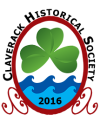
Claverack Historical Society
Code of Ethics
This code of ethics is a fluid document designed to guide those involved of this organization in such a manner that instills confidence, promotes public trust and an understanding of the value of this organization. The goal of the Claverack Historical Society is to promote the historic value of the town through the collection, preservation and interpretation of town artifacts, visual and nonvisual. Public displays and education of these historic articles will provide the public with a greater understanding of the historic value of our unique town. Although the operating environment of this organization will change over the years the basic premise of its foundation and function , to serve the people, and preserve the historical value of the Town of Claverack are paramount. To insure consistency and gain the public trust the following code of ethics has been adopted by the governing board of this organization and applies to all members and officers.
Organization governance in its various forms is a public trust responsible for the institution’s service to society. The governing authority protects and enhances the organization’s collections and programs and its physical, human and financial resources. It ensures that all these resources support the organization’s mission, respond to the pluralism of society and respect the diversity of the natural and cultural common wealth.
Thus, the governing authority ensures that:
- all those who work for or on behalf of the organization understand and support its mission and public trust responsibilities
- its members understand and fulfill their trusteeship and act corporately, not as individuals
- the organization’s collections and programs and its physical, human and financial resources are protected, maintained and developed in support of the organization’s mission
- it is responsive to and represents the interests of society
- it maintains the relationship with staff in which shared roles are recognized and separate responsibilities respected
- working relationships among trustees, employees and volunteers are based on equity and mutual respect
- professional standards and practices inform and guide operations
- policies are articulated and prudent oversight is practiced
- governance promotes the public good rather than individual financial gain.
Collections
The distinctive character of the organization’s ethics derives from the ownership, care and use of objects, specimens, and living collections representing the world’s natural and cultural common wealth. This stewardship of collections entails the highest public trust and carries with it the presumption of rightful ownership, permanence, care, documentation, accessibility and responsible disposal.
Thus, the organization ensures that:
- collections in its custody support its mission and public trust responsibilities
- collections in its custody are lawfully held, protected, secure, unencumbered, cared for and preserved
- collections in its custody are accounted for and documented
- access to the collections and related information is permitted and regulated
- acquisition, disposal, and loan activities are conducted in a manner that respects the protection and preservation of natural and cultural resources and discourages illicit trade in such materials
- acquisition, disposal, and loan activities conform to its mission and public trust responsibilities
- disposal of collections through sale, trade or research activities is solely for the advancement of the organization’s mission. Proceeds from the sale of nonliving collections are to be used consistent with the established standards of the organization’s discipline, but in no event shall they be used for anything other than acquisition or direct care of collections.
- the unique and special nature of human remains and funerary and sacred objects is recognized as the basis of all decisions concerning such collections
- collections-related activities promote the public good rather than individual financial gain
- competing claims of ownership that may be asserted in connection with objects in its custody should be handled openly, seriously, responsively and with respect for the dignity of all parties involved.
Programs
Organizations serve society by advancing an understanding and appreciation of the natural and cultural common wealth through exhibitions, research, scholarship, publications and educational activities. These programs further the organization’s mission and are responsive to the concerns, interests and needs of society.
Thus, the organization ensures that:
- programs support its mission and public trust responsibilities
- programs are founded on scholarship and marked by intellectual integrity
- programs are accessible and encourage participation of the widest possible audience consistent with its mission and resources
- programs respect pluralistic values, traditions and concerns
- revenue-producing activities and activities that involve relationships with external entities are compatible with the organization’s mission and support its public trust responsibilities
- programs promote the public good rather than individual financial gain.
Created 2/2016
